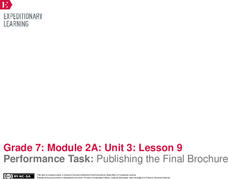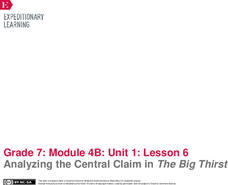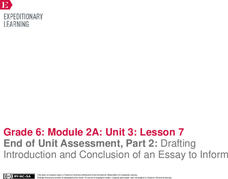EngageNY
Module Reflection and Writing Book Reviews
Scholars take time to reflect on the unit and the end-of-unit writing assessment. They use a Working Conditions Reflection to help guide them through the exercise. Readers then begin working on a book review for the book they have been...
EngageNY
Research: Paraphrasing Relevant Information
Readers take a look at the source Ethical Style: How Is My T-Shirt Made? and discuss how to say the information in the article without plagiarism. Learners make note of and underline sentences that may present a problem in paraphrasing....
EngageNY
Researching Digital Sources, Part 2: Guided WebQuest
Go surfing for the facts. Scholars continue their work using their Digital Resources on DDT sheet to find information by searching websites. After collecting information, they mix and mingle to hear information discovered by classmates.
EngageNY
Applying Research Skills: “Rachel Carson: Environmentalist and Writer”
It's important to cite sources! Scholars take a closer look at their research about DDT by examining how to cite sources. Learners take turns sharing information that would be used to cite sources to complement Rachel Carson:...
EngageNY
Close Reading and Gathering Evidence from Frightful’s Mountain and “Welcome Back”
Where did the falcons go? Scholars read the article Welcome Back which describes the disappearance of falcons due to the use of pesticides. During a second read, learners annotate the text by marking unfamiliar words and facts about...
EngageNY
Interpreting, Integrating, and Sharing Information about DDT: Using Cascading Consequences and Fishbowl Protocol
What is your interpretation? Scholars look at their Cascading Consequences Charts and interpret the information they have gathered. Learners match claims with evidence and then watch a video. At the end, they carry out a fishbowl...
EngageNY
Taking Notes Using a Graphic Organizer: Inferring About Work and Play in Colonial America
What was life like in colonial America? Follow this lesson and your pupils will find out what people in colonial times did for work and for fun. Ask learners to compare and contrast the two texts and explain what the reading helped them...
EngageNY
Taking Notes Using a Graphic Organizer: Inferring About the Importance of Religion in Colonial America
Improve class understanding of colonial times by reading an informational text and filling out the accompanying graphic organizer. Class members work with a partner to read, take notes, make inferences, and synthesize information.The...
Columbus City Schools
Sedimentary Rocks
Turn your class discussion of rock formation from ho-hum to holy hornfels! Junior geologists gain experience in identifying rock types and rock origins, with an emphasis in hypothesizing the environment needed to form certain rocks. The...
EngageNY
Setting Purpose for Research: What are Fair Working Conditions?
Life may not be fair but working conditions should be. Scholars research working conditions at Wegmans by studying the company website. They complete a working conditions anchor chart and discuss their findings in a think-pair-share...
EngageNY
Mid-Unit 3 Assessment and Independent Reading Check
It's time for scholars to be on their own. Individuals work independently reviewing sources to answer their research questions. Learners read "Are Your Clothes Made in Sweatshops?" to help complete the mid-unit assessment. After...
EngageNY
Researching: Asking the Right Questions
Learners look over the iCare about the iPhone performance task and discuss how it relates to working conditions. They then review the research process and place focus on the step of asking questions. Finally, scholars ask questions to...
EngageNY
Individual Research
Seventh graders get the option of choosing their own text from a selection to read and gather more information as part of their research. Learners discuss the difference in reading for research and reading for pleasure. They also begin...
EngageNY
Performance Task: Publishing the Final Brochure
Add your final touches! Seventh graders finish the final draft of the brochure they began in the previous lesson. They then reflect by talking with other learners to discuss their work. Peers talk about the choices they made in layout as...
EngageNY
Close Reading: Paragraphs 1–5 of “Water Is Life”
Be more specific. Scholars take a look at domain-specific vocabulary by discussing an anchor chart. They then look at vocabulary words recorded from paragraphs one through five in Water of Life. After analyzing the vocabulary used in the...
EngageNY
Analyzing Text Structure: “Water Is Life” Paragraphs
Water, water everywhere. Readers revisit paragraphs six through nine in the article "Water is Life" to answer text-dependent questions. They then pair up to reread the article focusing on its structure and record their thoughts on...
EngageNY
Analyzing the Central Claim in The Big Thirst
Quench the class's thirst for knowledge while building analytical skills. Scholars listen as the teacher reads excerpt from the book The Big Thirst. They then complete a close read and answer text-dependent questions from pages one...
EngageNY
Evaluating an Argument in The Big Thirst
Don't argue with me! Scholars first evaluate the argument in The Big Thirst. Learners work with partners to determine if the text supplies enough evidence to support the claim. They then complete a Tracing an Argument Note catcher for...
EngageNY
Tracing and Evaluating Arguments: “The Future of Water” and The Big Thirst
Can scholars predict the future? They try as they first watch the video The Future of Water to capture details and trace the argument. Next, individuals complete the Tracing an Argument
note catcher to guide their thoughts. To finish,...
EngageNY
End of Unit Assessment, Part 2: Drafting Introduction and Conclusion of an Essay to Inform
A powerful introduction and conclusion can really pack a punch. Using the resource, scholars first read and discuss a model essay. Then, as part of the end of unit assessment, they draft the introductory and concluding paragraphs of...
EngageNY
Reading for Gist: “Middle Ages” Excerpt 2
Read and repeat. Scholars repeat the strategies for digging deeper into text from lesson two. This time they focus on Middle Ages Excerpt 2. Learners write unfamiliar words in the word catcher and use details from the text to add to the...
EngageNY
Drafting Introduction and Conclusion
In conclusion ... Scholars analyze the model essay Adversity Faced by Townspeople in
the Middle Ages to gain a better understanding of introductory and concluding paragraphs. After studying the author's strategies, learners begin writing...
EngageNY
End of Unit Assessment: Final Essay
This is just the transition phase. Scholars participate in a mini lesson about using transitions in writing. They then have a brief peer critique of the introduction and conclusion paragraphs for their end of unit assessment. Learners...
EngageNY
Reading for Gist: “Middle Ages” Excerpt 1
Dig deep. Scholars dig deep for meaning while reading Middle Ages Excerpt 1. They begin by finding unfamiliar words and adding them to a word catcher. Pupils then take a close look at adversity in the text and complete an anchor chart.

























